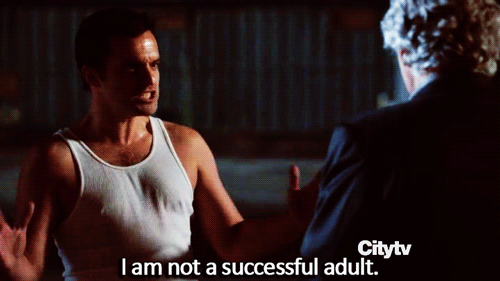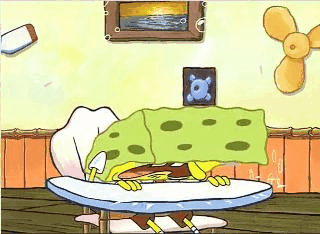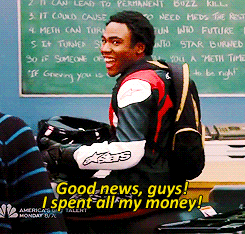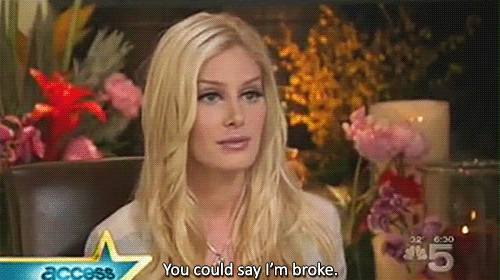If this is you, keep reading.
You won't feel like this - I promise.
A) Input - Output - The Breakdown
1) Input
What goes in should be more than what goes out. This is a basic tenet of budgeting. But what is coming in? Your first step in budgeting is taking a realistic look at what you make. If you have variable income (commission, tips, etc.), take your lowest guaranteed income and work from that. If you get paid weekly or biweekly, base your monthly income off a 4-week model. Add this to any additional income you receive to come up with your monthly income.
2) Output - Part 1 - The Non-Negotiables
Now we need to look at things you absolutely cannot cut out of your spending. This includes (for me) rent, utilities, minimum payments on any credit cards, my phone bill, health insurance, my student loan, my personal loan, transfers to my savings, and my identity theft protection. Television is NOT a necessity - do not put it in this category. If you owe a friend or family member money, a minimum payment to them should also be included here. Add this up.
3) Output - Part 2 - The Needs
Here's where we look at basic needs - food, gasoline, medicine, pet care, etc. If you drive to school or work, add up your mileage for the week, plus anywhere else you usually drive, throw in 50-75 miles per week of random mileage, then factor out your car's miles per gallon to find out how many tanks per month you will need. Take an average gasoline fill-up cost and use that to find your gasoline expenses for the month. Same thing with pet food - do yourself a favor and don't free-feed your pet. Feed them measured amounts - this will prevent obesity and promote healthy digestion while letting you know exactly how much Fido eats. Do some math and figure out how much it costs per month. Food is a hard category - here we are talking groceries - eating out is a want, not a need. My sister-in-law manages to feed herself, my brother, and cuter-than-any-other-baby nephew for $40 a week. If you are single, you can easily spend this or less and eat well. Add these all together.
NOT a budgeter.
4) Output - Part 3 - The Wants
Alright, you can have some fun. Here we have (for me) riding lessons, horse show fees, salon trips, going out, alcohol, etc. Total up what you typically spend on these and add it on in.
Don't be this guy.
B) Balancing Act
Now that we know what we make and what we spend, let's see how they compare. Let's start with what we make. Let's say your monthly income totals up to be $1600. Subtract from that your non-negotiables. Let's suppose these are $900. You now have $700 to work with. From here, we take out the costs of the needs. Let's say you calculate food, gas, etc. to be $500 per month. You now have $200 left for your wants. That's it. Don't play games here. One of the best ways to keep the wants under control is to use cash. It is all too easy to swipe a card, but if you're paying cash, when you're out of money, you're out of luck. This is a good stopper to keep Good Time Charlie from getting you into budget trouble.
Exactly.
You really don't wanna be her.
C) Debt Reduction
We've all been in debt, and if you haven't, I probably don't like you (kidding). Debt is a fact of life, but it can be managed. Dave Ramsey's plan is one of the best ideas out there, and it really works. Here's a paraphrasing of his first 3 steps:
1) $1000 Emergency Fund
2) Snowball Down Your Debt
3) 3-6 Months of Expenses Saved
At 24, this is as far as I've gotten. My work automatically does 401K stuff, so the fourth step (IRAs and retirement) is already back-burnering. So here's what I am doing:
1) I have begun an automatic monthly transfer to my savings account. I have one that also transfers $1 each time I swipe my debit card, which helps a little, too. Until I have $1000 saved, I am paying the minimum payment on my one credit card that has a balance.
2) Once I have my $1000 savings, I plan to take the amount I have been transferring to savings and add it to what I am paying on my credit card. This will pay down the balance more quickly. Once the credit card is zeroed, I will add that money to what I am currently paying to my personal loan, then once that is paid, what was being paid to the credit card, savings account, and personal loan will ALL go towards my student loan. By my calculations, I should be totally out of debt by my 27th birthday - that seems far off, but it's 2 1/2 years, and college was EXPENSIVE, y'all. This method works well. Ramsey recommends paying off the debts in order of balance from smallest to largest, and I have to agree. His theory is that you get a "win" when you pay off a balance and it motivates you to keep going. So take all your available extra money and put it towards the biggest payment on the smallest balance, and pay the minimum on the other debts. Snowball away.
3) Once I am out of all this debt, ALL of that money that I was spending on debts will go into a savings account to build 3-6 months of expenses. By this time, I will hopefully be living in a house instead of an apartment and hopefully have gotten a raise or promotion at work. However, all my factoring is done on the current model of how much I make - don't assume any more income than you currently have.
The Snowball keeps debt from feeling like this.
D) D Is For Discipline
The biggest problem for most people with budgeting and debt isn't that they don't make enough (although that can be the problem). It's having the discipline to say no to yourself and others. This can be super super hard, but it is worth it. One great night out at the bar won't seem as fun when you have a 500 credit score and more debt than you make in one year. Learn to cut things out of your life that you can't afford, especially if you are young. I know it sucks, but living beneath your means now will mean way more wealth for you in the future, which means a lot more fun later on. Do the leg work now, say no now, and you'll be better prepared for a lifetime full of fun. YOLO doesn't apply when it comes to money. That's why Lindsay Lohan is broke.
Bless her heart.
At any rate, I hope this helps. If nothing else, I hope this explains to y'all why I'm lame sometimes and say no to going out. It's not that I don't love you. It's that I love Gillian in 2015 more - that chick will be debt-free!
I expect it will feel like this.
And this.
And this.
And this.













No comments:
Post a Comment